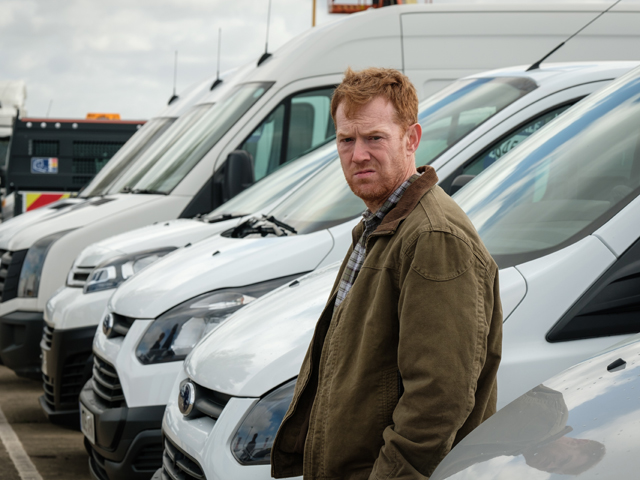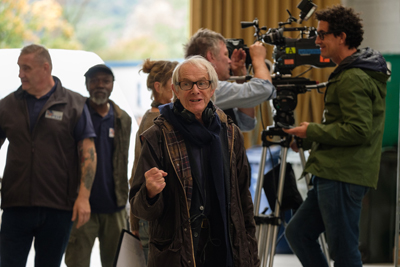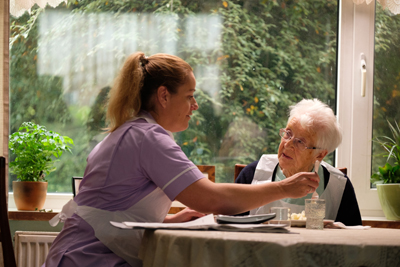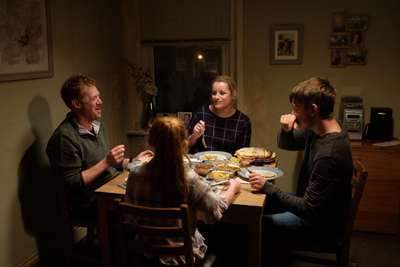Ken Loach Sorry We Missed You Interview

Cast: Kris Hitchen, Debbie Honeywood, Nikki Marshall
Director: Ken Loach
Genre: Drama
Rated: MA
Running Time: 91 minutes
Synopsis: Ricky, Abby and their two children live in Newcastle. They are a strong family who care for each other. Ricky has skipped from one labouring job to another while Abby, who loves her work, cares for old people. Despite working longer and harder they realise they will never have independence or their own home. It's now or never; the app revolution offers Ricky a golden opportunity. He and Abby make a bet. She sells her car so Ricky can buy a shiny new van and become a freelance driver, with his own business at last. The modern world impinges on these four souls in the privacy of their kitchen; the future beckons.
Director: Ken Loach
Genre: Drama
Rated: MA
Running Time: 91 minutes
Synopsis: Ricky, Abby and their two children live in Newcastle. They are a strong family who care for each other. Ricky has skipped from one labouring job to another while Abby, who loves her work, cares for old people. Despite working longer and harder they realise they will never have independence or their own home. It's now or never; the app revolution offers Ricky a golden opportunity. He and Abby make a bet. She sells her car so Ricky can buy a shiny new van and become a freelance driver, with his own business at last. The modern world impinges on these four souls in the privacy of their kitchen; the future beckons.
Interview with Ken Loach
Question: Where did the idea for Sorry We Missed You come from?
Ken Loach: After we'd finished I, Daniel Blake, I was thinking, "Well, maybe that's the last film." But when we were going to the food banks for our research many of the people that were coming in were working – part time, zero-hours contracts. This is a new type of exploitation. The so-called gig economy, the self-employed or agency workers, the casualised workforce just continued to feature in mine and Paul's [Laverty] ongoing daily conversations. Gradually the idea emerged that maybe there was another film that might be worth making – not exactly a companion piece to I, Daniel Blake but a related film.
 Question: Were you always thinking that there would be two strands to this story?
Question: Were you always thinking that there would be two strands to this story? Ken Loach: No, I think what grew in Paul's mind was not only the level of exploitation for the individual worker but the consequences for family life and how everything refracts into personal relationships. The middle class talk about work-life balance; the working class are stuck with necessity.
Question: Is this a new problem or is it an old one in a different guise?
Ken Loach: It is only new in the sense that it's modern technology that's being used. The most sophisticated technology is in the driver's cab, dictating the routes, allowing the customer to know exactly where the parcel is that they've ordered and its estimated time of arrival. It will arrive, if it's a so-called 'preciser', within a certain hour. The consumer is sitting at home tracking this vehicle all around the neighbourhood. It's an extraordinarily sophisticated piece of equipment with signals bouncing off a satellite somewhere. The result is one person knocking themselves out in a van going from pillar to post, from street to street, running to meet the demands of this equipment. The technology's new; the exploitation is as old as the hills.
Question: How did you research the film?
Ken Loach: Paul did most of the research, then we met some people together. Drivers were often quite reluctant to speak. They didn't want to risk their jobs. The depots were difficult places to get into. A very helpful man from a depot not too far away from where we were filming, who was the manager, gave us very precise advice in setting up the depot itself. The drivers in the film are almost all current drivers or ex-drivers. When we were doing those scenes, they knew the game; they knew the process, how it worked and the pressures of getting it done fast.
Question: What struck you most from your research?
Ken Loach: I think what is surprising is the hours that people must work to make a decent living, and the insecurity of their work. They're self-employed, and in theory it's their business, but if something goes wrong, they take all the risk. Quite easily something can go wrong with the van and they get the equivalent of the sanctions on Daniel Blake if they're not there to deliver the service. Then they can lose a lot of money very, very quickly. For care workers like Abby it's the idea that they can be out doing visits for 12 hours but only get six or seven hours pay on the minimum wage.
Question: Introduce us to the characters in Sorry We Missed You
Ken Loach: Abby is a mother in a good marriage – she and Ricky are friends, there's affection between them, they trust each other and they both try to be good parents. Her problem is trying to care for her kids in the way she'd like to: she's working so hard that she's not there, so most of the time she's having to give instructions to the kids over the phone. Of course, that tends to go wrong because kids are kids and she's not back till late at night. She's relying on buses, which are not that frequent, so a lot of time is spent hanging around at bus stops.
Question: Who is her employer? Where does the pressure come from?
Ken Loach: The employer is an agency. The care work is sub-contracted by the local council through an agency or a private healthcare company. They get the contract because they put in a low price. The authorities turn a blind eye to the fact that the low price is based on exploitation of the people doing the work. It's much harder for the people who are working for a private healthcare company to get organised into a union than workers who work for a local authority and have proper contracts.
Question: Who is Ricky?
Ken Loach: Ricky is a grafter, as he says himself. He was a building worker, probably served his time in one of the trades, probably plumbing or joinery. He was doing quite well – they'd saved enough for a deposit for a house. That coincided with the collapse of banks and building societies that left people like Ricky and Abby unable to get a mortgage. The building trade suffered, Ricky lost his job, and since then he's gone from job to job. He can turn his hand to anything. When we meet him, Ricky decides he wants to work as a delivery driver, where it seems that you can make a lot of money. The family is still in rented accommodation, they are not making enough to get out of debt, they've been existing hand to mouth for a few years, so this is a chance of working like hell for two or three years, get a deposit for a house, and then be able to live a normal life again. That's his plan. He's an engaging guy, very easy to get on with, and being from Manchester, he's a Manchester United fan, committed to making a success of his new job. People in Ricky's position have to exploit themselves, no need for a foreman to crack the whip. They have to run themselves into the ground to make a decent income: the ideal situation for an employer.
Question: What is Abby and Ricky's family set-up?
Ken Loach: There are two kids. Seb is 16 and neither parent is there to keep an eye on him. He's going off the rails. He's got talents, artistic and creative, that they don't know about. What they do know is that he's bunking off school, and he is getting into trouble. The sparks fly between father and son. Ricky is 7 a bit old school – he just tells Seb what to do and expects him to do it, and of course Seb doesn't. A confrontation is bound to happen. Then there's Liza Jane. She's a very bright kid. She's the peacemaker in the family with a quirky sense of humour and red hair like her dad. She just wants everyone to be happy. She tries to keep the family together when it's all firing off in different directions.
 Question: How was the shoot in Newcastle?
Question: How was the shoot in Newcastle? Ken Loach: As usual we shot it in sequence. The actors didn't know how it was going to end. Each episode was news to them. We rehearsed the family beforehand so that they had worked out something of the relationships between them. After that we shot it pretty quickly, in five and a half weeks. One of the main challenges was getting the parcel delivery depot right. We had to know the exact process and for everyone to know exactly what their job was and then we shot it like a documentary. We worked out who were going to be the people who received the parcels when they first came in, the sorters, who were the drivers bringing their vans in, what happened at each stage, the whole chain of events. Fergus and the design team did a brilliant job to enable that to happen. Choreographing it was a challenge because it was a big, echoey working depot in an industrial estate. But the guys were terrific. They got stuck in and did it with a real relish. I hope that in the shots you can see that they know what they're doing, they're doing it fast, they're doing it under the eagle eye of the depot manager who cracks the whip. Everything had to be authentic. Nobody had to pretend. We wanted the urban landscape of Newcastle to be present in the film but not so that it looked like tourist shots, not just to show off the city. I think you do get a sense of the landscape: you see the old terraces; you see the tower blocks and you see the city centre with its classic architecture.
Question: What questions do you think are posed by Sorry We Missed You?
Ken Loach: Is this system sustainable? Is it sustainable that we acquire our shopping through a man in a van knocking himself to pieces 14 hours a day? Is that, in the end, a better system than going to shops ourselves and talking to the shopkeeper? Do we really want a world in which people are working under such pressure, with the knock-on effects on their friends and their family and the narrowing of their lives? This is not the market economy failing – on the contrary, this is a logical development for the market, brought about by harsh competition to cut costs and maximise profit. The market is not interested in our quality of life. The market is interested in making money and the two are not compatible. The working poor, people like Ricky, Abby and their families, pay the price. But in the end, all this count for nothing unless the audience believes in the people on screen, cares for them, smiles with them and shares their troubles. It is their lived experiences, recognised as authentic, that should touch us.
Interview with Rebecca O'Brien, Producer
Question:
Rebecca O'Brien: answer
Question: How did Sixteen Films get from I, Daniel Blake to Sorry We Missed You?
Rebecca O'Brien: We didn't expect I, Daniel Blake to have the impact that it did, but with over 700 community screenings and a continued desire for people to talk about it, and to use the film as a fundraiser, it became a sort of totem. It was discussed in parliament and became a point of reference. People recognised themselves or people they knew in that film, and I think that a lot of people had been afraid to talk about the humiliation that the system put them through. It made it possible for people to feel that they weren't alone in their situation. We did so many talks and discussions about I, Daniel Blake, met so many people who spoke of their experience, that it gave us the impetus to make Sorry We Missed You. The conversations between Ken and Paul continued. Paul particularly got into the issues around insecure jobs and realised that there was another story to be told. What 8 fitted so well was that whereas I, Daniel Blake deals with the world of benefits and welfare, Sorry We Missed You is about the world of work and the people Theresa May would call "just about managing." Then Paul wrote the characters of Ricky, Abby and their two kids.
Question: Why did you choose to return to Newcastle to make it?
Rebecca O'Brien: Newcastle is compact and comparatively easy to get around. That does make a difference: whereas in some cities you might take an hour to get from one place to another in Newcastle that journey might take 15 or 20 minutes. Also, it's got a very strong cultural identity, while at the same time representing all of Britain in microcosm: it's a city with the highs and lows, good things and bad things about it that any British city might have. Because we got to know it through I, Daniel Blake, it made it much easier for us to come back here. We know the infrastructure and the people to work with, and value the warmth of their welcome and enthusiasm.
Question: Is Sorry We Missed You a specifically British story, or is it universal?
Rebecca O'Brien: Britain is certainly not the only country that is instigating zero-hours contracts and operating systems like our care system. 'Precarious working' is to be found across the whole of Europe. We all buy things online, get them delivered by courier and everybody knows somebody who has been through the care system – a granny or a mother or a sister or a brother. We've seen it both being wonderful and terrible. We hope this film will show what both of those systems do to the children of overworked parents who don't have enough time for them.
 Question: What bearing does the global financial crisis of 2008 have on the story?
Question: What bearing does the global financial crisis of 2008 have on the story?
Rebecca O'Brien: It's our backstory. I think in 2008 our couple might just have been able to get their mortgage together, but then banks and building societies collapsed and those who suffered were the most vulnerable. Where they might have had a mortgage, and might have had a place of their own, instead they're stuck living in temporary rented accommodation. The other way it affected them is in the austerity programme. Abby and Ricky are both working, they should be fine, but they are underpaid. Ricky is desperate to break through and make something more for himself, so he can provide more for his family.
Question: How has Sorry We Missed You been financed?
Rebecca O'Brien: Once again it has been a co-production with the wonderful Why Not and Wild Bunch in France, who've both been incredibly supportive. BBC Films have come back on board again, as well as the BFI. Also, thanks to the BFI's Locked Box scheme we were able to recoup some money from I, Daniel Blake which has been invested in Sorry We Missed You. It's a great way to recycle lottery money and it means I, Daniel Blake has helped to pay for this film.
Question: Is it becoming harder to get films like yours off the ground?
Rebecca O'Brien: It is getting increasingly difficult to make independent British films. The audience has dwindled globally for independent films in recent years. That's another knock-on effect from the financial crisis, because after 2008 sales halved. People are far more risk-averse now. Films are having to be funded through all sorts of deals, equity breaks and patchwork funding. Luckily, with Why Not and Wild Bunch as partners that's not been the case with our recent films: I'm in a very privileged position as a producer. It would be much more difficult to be starting out and doing the same thing.
Question: You often work with the same crew. What does that bring to the production?
Rebecca O'Brien: In terms of the look, the production design, the editing and the music, having those creative elements coming from the same sources does give a continuity. There's a shared vision of how the film should be that is consistent. Overall, I think it helps to have the look being similar, because if you put Ken's films together it is one long story of our lives. I would like to think that in 200 years' 9 time, if somebody wanted to have a look at the social history of our era, they might get something out of seeing 50 years' worth of Ken Loach's and the writers' films.
Rebecca O'Brien: answer
Question: How did Sixteen Films get from I, Daniel Blake to Sorry We Missed You?
Rebecca O'Brien: We didn't expect I, Daniel Blake to have the impact that it did, but with over 700 community screenings and a continued desire for people to talk about it, and to use the film as a fundraiser, it became a sort of totem. It was discussed in parliament and became a point of reference. People recognised themselves or people they knew in that film, and I think that a lot of people had been afraid to talk about the humiliation that the system put them through. It made it possible for people to feel that they weren't alone in their situation. We did so many talks and discussions about I, Daniel Blake, met so many people who spoke of their experience, that it gave us the impetus to make Sorry We Missed You. The conversations between Ken and Paul continued. Paul particularly got into the issues around insecure jobs and realised that there was another story to be told. What 8 fitted so well was that whereas I, Daniel Blake deals with the world of benefits and welfare, Sorry We Missed You is about the world of work and the people Theresa May would call "just about managing." Then Paul wrote the characters of Ricky, Abby and their two kids.
Question: Why did you choose to return to Newcastle to make it?
Rebecca O'Brien: Newcastle is compact and comparatively easy to get around. That does make a difference: whereas in some cities you might take an hour to get from one place to another in Newcastle that journey might take 15 or 20 minutes. Also, it's got a very strong cultural identity, while at the same time representing all of Britain in microcosm: it's a city with the highs and lows, good things and bad things about it that any British city might have. Because we got to know it through I, Daniel Blake, it made it much easier for us to come back here. We know the infrastructure and the people to work with, and value the warmth of their welcome and enthusiasm.
Question: Is Sorry We Missed You a specifically British story, or is it universal?
Rebecca O'Brien: Britain is certainly not the only country that is instigating zero-hours contracts and operating systems like our care system. 'Precarious working' is to be found across the whole of Europe. We all buy things online, get them delivered by courier and everybody knows somebody who has been through the care system – a granny or a mother or a sister or a brother. We've seen it both being wonderful and terrible. We hope this film will show what both of those systems do to the children of overworked parents who don't have enough time for them.
 Question: What bearing does the global financial crisis of 2008 have on the story?
Question: What bearing does the global financial crisis of 2008 have on the story? Rebecca O'Brien: It's our backstory. I think in 2008 our couple might just have been able to get their mortgage together, but then banks and building societies collapsed and those who suffered were the most vulnerable. Where they might have had a mortgage, and might have had a place of their own, instead they're stuck living in temporary rented accommodation. The other way it affected them is in the austerity programme. Abby and Ricky are both working, they should be fine, but they are underpaid. Ricky is desperate to break through and make something more for himself, so he can provide more for his family.
Question: How has Sorry We Missed You been financed?
Rebecca O'Brien: Once again it has been a co-production with the wonderful Why Not and Wild Bunch in France, who've both been incredibly supportive. BBC Films have come back on board again, as well as the BFI. Also, thanks to the BFI's Locked Box scheme we were able to recoup some money from I, Daniel Blake which has been invested in Sorry We Missed You. It's a great way to recycle lottery money and it means I, Daniel Blake has helped to pay for this film.
Question: Is it becoming harder to get films like yours off the ground?
Rebecca O'Brien: It is getting increasingly difficult to make independent British films. The audience has dwindled globally for independent films in recent years. That's another knock-on effect from the financial crisis, because after 2008 sales halved. People are far more risk-averse now. Films are having to be funded through all sorts of deals, equity breaks and patchwork funding. Luckily, with Why Not and Wild Bunch as partners that's not been the case with our recent films: I'm in a very privileged position as a producer. It would be much more difficult to be starting out and doing the same thing.
Question: You often work with the same crew. What does that bring to the production?
Rebecca O'Brien: In terms of the look, the production design, the editing and the music, having those creative elements coming from the same sources does give a continuity. There's a shared vision of how the film should be that is consistent. Overall, I think it helps to have the look being similar, because if you put Ken's films together it is one long story of our lives. I would like to think that in 200 years' 9 time, if somebody wanted to have a look at the social history of our era, they might get something out of seeing 50 years' worth of Ken Loach's and the writers' films.
MORE



